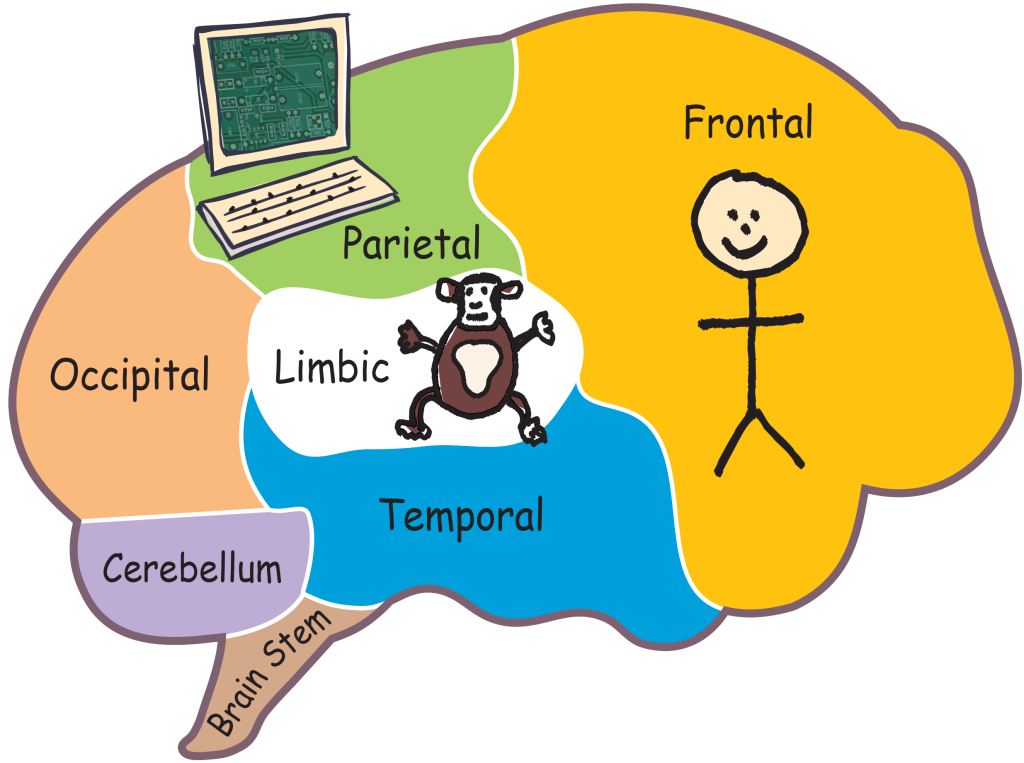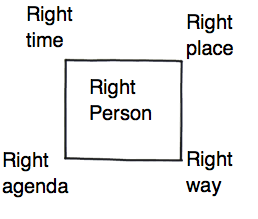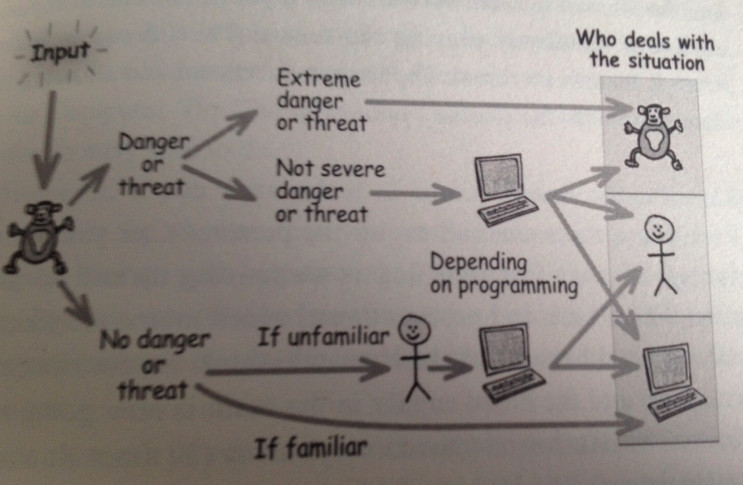The Chimp Paradox - Steve Peters

Date read: 06/12/2016
Summary
Prof Steve Peters describes his mind management model that stars the Chimp, our emotional machine that runs riot if left unchecked.
Structure
The book is formed of 3 parts:
- The Inner Mind Explored
- Day-to-day Functioning
- Your Health, Success and Happiness
It also follows a planetary model for each individual section.

Quotes
“All input goes to the chimp first.” - p43
“It’s the way you deal with things, not what happens, that gives you peace of mind.” - p115
“Body language is generally chimp to chimp.” - p172
“How important is this situation to the rest of my life?” - p199
“Successful people are proactive.” - p230
“If you wake during the night, any thoughts and feelings you might have are from your Chimp and they are often very disturbing, catastrophic and lacking in perspective. In the morning you are likely to regret engaging with these thoughts and feelings because you will see things differently.” - p233
“One of the factors that differentiate successful people from unsucessful people is the ability to recognise when they need help and get it from the best source. - p243
“Motivation is chimp driven.” - p251
“Personal excellence is defined as doing your best. - p261
“We live in a world that is in a constant state of change and it cannot exist in any other way. - p326
Key Takeaways
The psychological mind
The chimp model assigns a character to three sections of the human brain:

- Frontal (the human)
- Limbic (the chimp)
- Parietal (the computer)
You are the human, your chimp is an emotional thinking machine and your computer is a storage area and automatic functioning machine. Any one of them can take complete control but they usually work together.
Emotional vs logical thinking
You (logical) and your chimp (emotional) have very different ways of thinking. The chimp faster than you and always reacts first, this is why you feel criticised, get upset and make emotional judgements without really knowing why. The chimp jumps to conclusions and views everything in black and white.
The human and the chimp have different agendas to fulfil. Your chimp operates to survive (law of the jungle) and the human operates by the laws of society.
The chimp will hijack you if you don’t manage it successfully. It can be your best friend or your worse enemy - the chimp paradox.
Jungle centre
The chimp’s jungle centre is based on it’s instincts and drives:
- Instincts (flight, fight or freeze)
- Drives (e.g. food, sex, power)
- Vulnerable stance (insecurity)
- Body language
Humanity centre
The human is motivated by:
- Honesty
- Compassion
- Conscience
- Law-abiding
- Self-control
- Purpose
- Achievement and satisfaction
Gender
Female chimps are quicker to become anxious and will therefore delay decision making. However, the female and male humans are the same.
Managing your chimp
Your chimp is 5 times stronger than you. Nuture, then manage your chimp, don’t try to control it. There are 3 ways to manage your chimp:
- Exercise (letting the chimp vent)
- Box (using facts and logic to reason with your chimp)
- Banana (distractions and rewards)
The computer
The computer has two functions, automatic response and acting as a referencing machine. It is 20 times faster than the human and 4 times faster than the chimp.
What is in the computer?
- Autopilots (constructive and helpful)
- Gremlins (destructive and unhelpful - removable)
- Goblins (descructive and unhelpful - unremovable)
- Stone of Life (ultimate reference point - truths of life, values and life force)
The computer also holds your Mindset, how you see the world.
It is vital to get the computer in the right working order. This involves replacing gremlins with autopilots, working on your Stone of Life and choosing the right Mindset.
Should gremlin
A common gremlin is brought into the world with the word “should”, the chimp doesn’t like this! Replace it with “could.”
Personality
Personality is a combination of your human, chimp and computer. You can work on all three to adjust your personality.
The brain works as follows depending on your programming:
Dealing with others
- Accept people for who they are.
- Don’t have preconcieved notions of who they might be.
- Walk away from people who don’t share your beliefs.
- Invest in those whom you care about.
- 1/5 people will not like you!
The troop
Your chimp needs a troop for reassurance. Opinions from outside your troop are not important. The chimp looks for strong individuals, whereas the human will look for people who can offer friendship and companionship. Each person in the troop will have a different role in fulfilling your needs. Invest time in your troop to make sure it functions well.
Communication
Make sure you are in the center of the square of communication:

Just because you have told someone something doesn’t mean they have heard or understood it! The way you package what you say is critical.
Assertiveness over agressiveness
Remove emotion from speech and choose your words carefully. Make sure it is your chimp that is doing the communicating.
Helicopter
When in a stressful moment, imagine that you are in a helicopter looking down on the situation.
Making decisions
- Gather all possible information.
- Accept that you won’t be able to gather every bit of information.
- Look at the consequences of each choice.
- Tell your chimp to stop making it into a catastrophe and to get some perspective.
- If appropriate then try laughing at the situation.
- If you still can’t decide then toss a coin!
